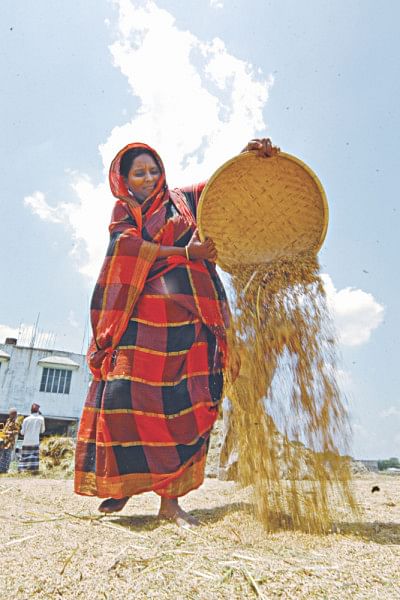HER LOST LAND

I do not usually write very easily. As someone working mostly with people with little or no literacy, my forte, as I would like to call it, is the oral tradition. I speak, I talk, I converse. I write today based on my perceptions from my work with rural women with whom I have lived and learnt from over the last four decades.
Women come from different backgrounds, in terms of class, religion, ethnicity, ability and so on. Yet, where land is considered, we tend to see similarities. What is the relationship between women and land? Is she simply a passive and submissive recipient of the benefits she receives as a family member? Is she an unpaid and unrecognised pair of hands needed for fulfilling family chores? Does she feel the same ownership and entitlement over the land of her family, as the men do? Does ownership have the same connotation as entitlement? These are questions that often come to my mind as I work with both men and women, when I try to promote or introduce the idea of what ownership of land means to women.
Let's be clear on one front: without confronting existing patriarchal structures, any intervention only serves to continue existing imbalances. In the area of resources too, land rights and a pro-women land redistributive policy are considered too radical or not an option, even as we loudly proclaim our commitment to women's progress. Excuses of cultural practices, traditions and taboos are conveniently brought up when women's, and particularly excluded and marginalised women's, access and rights are in question. The only place where women's access to land is mentioned is in case of inheritance rights, as determined by religious, traditional or social constructs, but not as an entitlement, not as a right as an equal citizen and not as part of a redistributive policy.
Given the changes in the current agriculture production systems, the peasant no longer produces for the family or for the local market; the system is now a market-led production system, in which the women, too, are being employed or engaged simply as labour. Previously, the woman in the peasant family had a crucial role to play post-harvest, in seed preservation, growing of vegetables, and tending of poultry and cattle for her family. Even though her role as the carer and in many cases the provider was never given the value it deserved, at least it allowed her to demarcate a space of her own.
The commercialisation of production processes which were traditionally the domain of women and the intrusion of a market-led economy even at the lowest household level of production have further exacerbated women's alienation from the means of production. The process of transforming fertile agriculture land into a barren saline desert through the promotion of a deliberately created global market for shrimp aquaculture industry—forcibly grabbing land from local agriculture producers and fishers dependent on the existing natural resources for their livelihoods—is a prime example of the negative consequences of an export-led market economy where women get demoted to lowly paid insecure labour, from being a main actor in agriculture or related processes. Additionally, since this industry enjoys the protection of the powers that be—within the government, political bigwigs, donors and business interest groups—women living in shrimp cultivation areas face the added fear of violence and rape without having access to any kind of recourse.
Another example of a destructive market-led intervention would be the conversion of indigenous lands for tobacco plantations and other forms of cash crops or pulp forests for profit. These types of exploitation of natural resources in the name of development have most severe impacts on indigenous and rural populations. Yes, women do find employment opportunities as a result of these changes, but at what cost? Low paid employment in which they have no agency, as opposed to what they were in control of, even if it did not provide them with cash. We should learn to calculate and put an economic value to what has been lost, and compare it to the meagre amount she is now forced to work for.
The gendered discrimination so firmly entrenched in our personal laws add even more to women's vulnerabilities. In Muslim family laws, though the woman does inherit in theory—albeit half of what her male counterpart in the family structure does—in reality, whatever little she receives does not go to her. It is controlled and manipulated in the brothers' name to keep it within the family. She forgoes her inheritance in the misguided belief that when in distress, she will be looked after by her brothers—a phenomena that seldom happens. If she does keep her inherited property, for the sake of maintaining her marriage, she often gives it to her husband. As is well known, in Muslim law, if a man has no sons and only daughters, the daughters will only inherit a part, while the rest will go to male relations as specified. In Hindu law, a widow or unmarried daughter only gets the right of residence but no inheritance rights.

The social norms of the Muslim majority of the country are now penetrating the practices of other religions that are more equal in this matter, seeping even into matrilineal societies such as the Khasis and Garos. A case that I am familiar with, which needed my intervention, involved a childless Catholic couple, where the male partner died. After his demise, many of his relatives insisted on following the Muslim practice of transferring the property to the husband's family rather than to the wife. They even managed to get a priest from a neighbouring area (not of their own), who stated the same. Luckily, the case was resolved with the widow now living in peace in her own marital home. However, the episode does highlight how religious or customary laws are being bent to suit the status quo.
For the landless with whom I work, government rules state that women headed households, who now constitute over 15.5 percent of Bangladesh's population, will only receive khas land provided she has an able-bodied son. In all other cases, the Khas land is registered in the name of both the husband and wife. However, as is to be expected, the wife has no say, control or possession of the land in her name. In case of a divorce, the man simply states the land was given to his wife, thus the land is not hers. Even when laws have been enacted and attempts made to implement them, not much progress can be noticed when something as crucial, as central, as land is concerned.
Empowerment is a key factor in ensuring women's right to development. Empowerment is the process of change through which those who have been denied the ability to articulate their needs, exercise their rights and influence the decision-making processes which shape their lives, are enabled to do so. The dimension that needs to be looked at concurrently when understanding the concept of empowerment is that of resources, both tangible as well as intangible—including the question of power and agency, i.e. the ability to define and articulate needs and priorities and to act upon them. The failure of the poor and disenfranchised, more particularly women, to achieve their valued goals, is a reflection of the underlying asymmetries in their basic capabilities. However, it has to be understood that these underlying asymmetries do not exist due to their just being so, but very clearly due to the structures of power that are reinforced continuously, often in the name of culture and development.
Khushi Kabir is a rights activist and the coordinator of Nijera Kori.

 For all latest news, follow The Daily Star's Google News channel.
For all latest news, follow The Daily Star's Google News channel. 



Comments